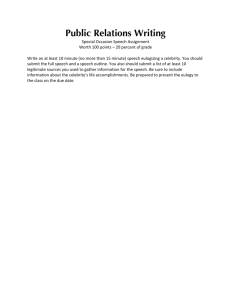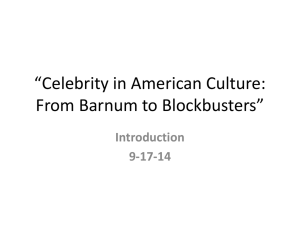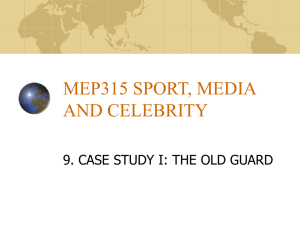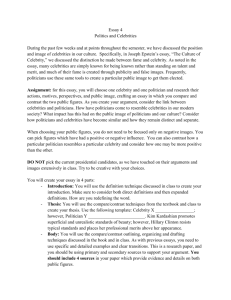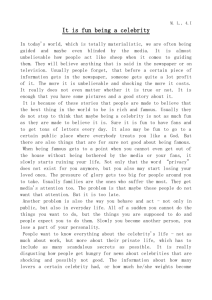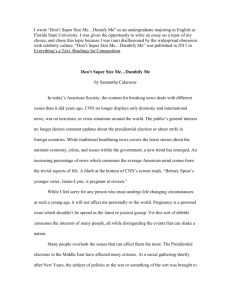Celebrity Endorsements Some of the most popular commercials
advertisement
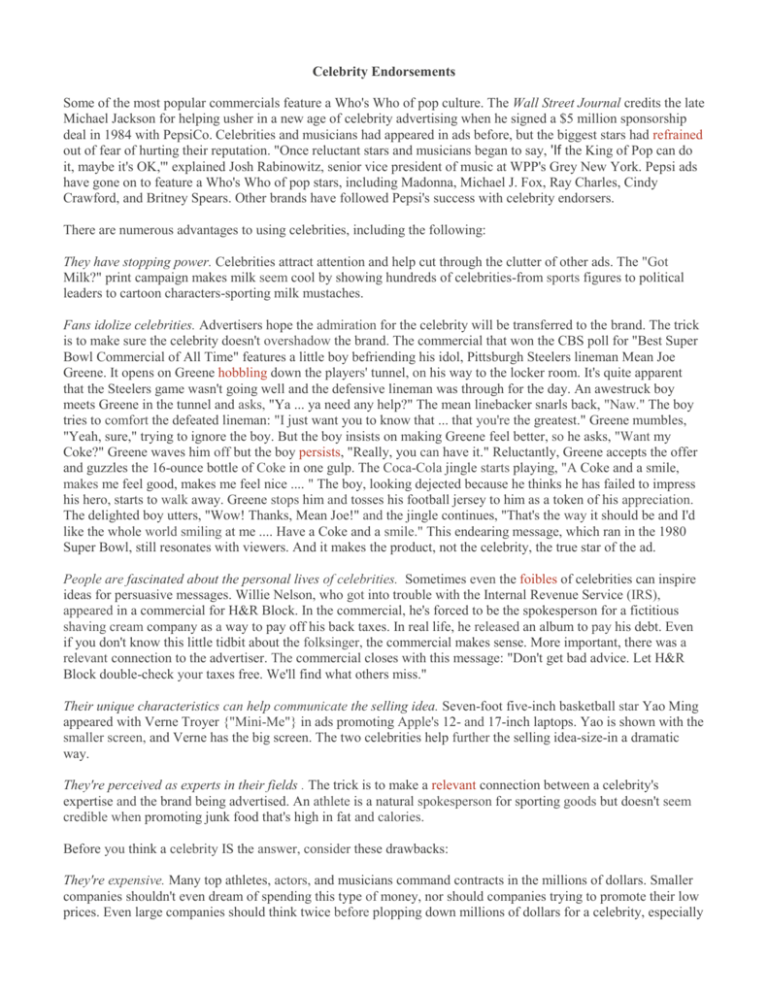
Celebrity Endorsements
Some of the most popular commercials feature a Who's Who of pop culture. The Wall Street Journal credits the late
Michael Jackson for helping usher in a new age of celebrity advertising when he signed a $5 million sponsorship
deal in 1984 with PepsiCo. Celebrities and musicians had appeared in ads before, but the biggest stars had refrained
out of fear of hurting their reputation. "Once reluctant stars and musicians began to say, 'If the King of Pop can do
it, maybe it's OK,'" explained Josh Rabinowitz, senior vice president of music at WPP's Grey New York. Pepsi ads
have gone on to feature a Who's Who of pop stars, including Madonna, Michael J. Fox, Ray Charles, Cindy
Crawford, and Britney Spears. Other brands have followed Pepsi's success with celebrity endorsers.
There are numerous advantages to using celebrities, including the following:
They have stopping power. Celebrities attract attention and help cut through the clutter of other ads. The "Got
Milk?" print campaign makes milk seem cool by showing hundreds of celebrities-from sports figures to political
leaders to cartoon characters-sporting milk mustaches.
Fans idolize celebrities. Advertisers hope the admiration for the celebrity will be transferred to the brand. The trick
is to make sure the celebrity doesn't overshadow the brand. The commercial that won the CBS poll for "Best Super
Bowl Commercial of All Time" features a little boy befriending his idol, Pittsburgh Steelers lineman Mean Joe
Greene. It opens on Greene hobbling down the players' tunnel, on his way to the locker room. It's quite apparent
that the Steelers game wasn't going well and the defensive lineman was through for the day. An awestruck boy
meets Greene in the tunnel and asks, "Ya ... ya need any help?" The mean linebacker snarls back, "Naw." The boy
tries to comfort the defeated lineman: "I just want you to know that ... that you're the greatest." Greene mumbles,
"Yeah, sure," trying to ignore the boy. But the boy insists on making Greene feel better, so he asks, "Want my
Coke?" Greene waves him off but the boy persists, "Really, you can have it." Reluctantly, Greene accepts the offer
and guzzles the 16-ounce bottle of Coke in one gulp. The Coca-Cola jingle starts playing, "A Coke and a smile,
makes me feel good, makes me feel nice .... " The boy, looking dejected because he thinks he has failed to impress
his hero, starts to walk away. Greene stops him and tosses his football jersey to him as a token of his appreciation.
The delighted boy utters, "Wow! Thanks, Mean Joe!" and the jingle continues, "That's the way it should be and I'd
like the whole world smiling at me .... Have a Coke and a smile." This endearing message, which ran in the 1980
Super Bowl, still resonates with viewers. And it makes the product, not the celebrity, the true star of the ad.
People are fascinated about the personal lives of celebrities. Sometimes even the foibles of celebrities can inspire
ideas for persuasive messages. Willie Nelson, who got into trouble with the Internal Revenue Service (IRS),
appeared in a commercial for H&R Block. In the commercial, he's forced to be the spokesperson for a fictitious
shaving cream company as a way to pay off his back taxes. In real life, he released an album to pay his debt. Even
if you don't know this little tidbit about the folksinger, the commercial makes sense. More important, there was a
relevant connection to the advertiser. The commercial closes with this message: "Don't get bad advice. Let H&R
Block double-check your taxes free. We'll find what others miss."
Their unique characteristics can help communicate the selling idea. Seven-foot five-inch basketball star Yao Ming
appeared with Verne Troyer {"Mini-Me"} in ads promoting Apple's 12- and 17-inch laptops. Yao is shown with the
smaller screen, and Verne has the big screen. The two celebrities help further the selling idea-size-in a dramatic
way.
They're perceived as experts in their fields . The trick is to make a relevant connection between a celebrity's
expertise and the brand being advertised. An athlete is a natural spokesperson for sporting goods but doesn't seem
credible when promoting junk food that's high in fat and calories.
Before you think a celebrity IS the answer, consider these drawbacks:
They're expensive. Many top athletes, actors, and musicians command contracts in the millions of dollars. Smaller
companies shouldn't even dream of spending this type of money, nor should companies trying to promote their low
prices. Even large companies should think twice before plopping down millions of dollars for a celebrity, especially
in a bad economy. High-priced celebrity endorsers may give consumers, stockholders, and employees the
impression that a company is wasting money.
They're often a quick fix, not a long-term strategy. Celebrities go in and out of fashion, and as their popularity level
shifts, so does their persuasiveness. Look at a People magazine from a decade or two ago. How many of the former
superstars are still super popular? Rapper MC Hammer made it big in the 1980s and spent money as if his star
power would last forever. Soon he was out of the limelight and in debt, which prompted an idea for a Nationwide
Insurance ad. The commercial opens with Hammer dancing to "U Can't Touch This" in front of a mansion with a
gigantic, glittering "H" over the doorway {bling for a mansion}. The commercial cuts to "5 minutes later" and
shows Hammer sitting in front of his mansion, which has a foreclosure sign. The message: "Life comes at you fast
and when it does, Nationwide can help." The self-deprecating humor helps further the message that life is filled
with uncertainty. Likewise, a 2009 Super Bowl commercial for Cash4Gold shows Hammer touting, "I can get cash
for this gold medallion of me wearing a gold medallion!" In both ads, the has-been celebrity works better than
someone who's widely popular.
They may lack credibility. Even though the Federal Trade Commission requires celebrities to actually use the
products they endorse, 63 percent of respondents in a study published in Advertising Age said that celebrities are
"just doing it for the money," and 43 percent believed celebrities "don't even use the product."
They may endorse so many products that it confuses people. Tiger Woods got into hot water for bouncing a Titleist
golf ball on the wedge of a Titleist golf club while shooting a Nike commercial.
They can overshadow the message. Although a celebrity may draw attention to an ad, some consumers focus their
attention on the celebrity and fail to note what's being promoted. In one spot, Yao Ming tries to pay for a souvenir
from New York City by writing a check. The cashier responds, "Yo," pointing to a sign that says "no checks." Yao
corrects her, "Yao." They go back and forth with the Yo, Yao routine and the spot closes with a brief pitch for
Visa's check card. The commercial is a clever spin on the "who's on first" routine. The audience will likely
remember Yao's name, but it's not as certain they'll remember which credit card company paid for the ad. The Visa
brand name could easily have been made dominant if the cashier had asked the Chinese athlete to show his visa and
passport and he presented his Visa check card instead.
They may disparage your brand when they think no one's listening. Executives from Adidas AG weren't amused
when they read a blog from their star endorser, Gilbert Arenas. The Washington Wizards guard blogged about a
signature Adidas shoe that had not yet been revealed to the public: "I'm sitting there looking at the shoe like '1 hope
you guys aren't serious. Because I'm not going to wear this shoe .... Nobody is going to wear this shoe.'" He went on
to say it reminded him of something a ballerina would wear. An Adidas spokesman told the Wall Street Journal
that in the end the company benefited from the commentary. Adidas reworked the design and Arenas blogged "I
think people are going to like the colors, but they're also going to like the shoe."
Bad press about the celebrity can hurt the sponsor. The Kellogg Co. didn't renew Michael Phelps's contract after a
British tabloid published a photo of the Olympic champion smoking pot at a campus party. Nike suspended its
contract with NFL star Michael Vick after the NFL star was linked with an illegal dog-fighting ring. Kmart
canceled its contract with golfing veteran Fuzzy Zoeller after he joked about Tiger Woods eating fried chicken and
collard greens. And O. J. Simpson, once one of the most popular endorsers, probably won't be asked to appear in
any commercials in the future.
"Having a highly paid, highly visible celebrity endorser is like having an expensive beach home on the Florida
coast. It’s swell, if you don't mind lying awake all night worrying about approaching storms," says Bob Garfield,
ad critic at Advertising Age.
-Adapted from DREWNIANY/JEWLER. Creative Strategy in Advertising,
IOe (pp. 12-16) Copyright © 2011 Cengage Learning.
